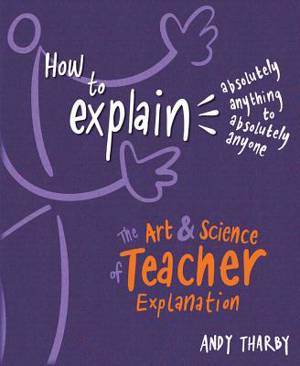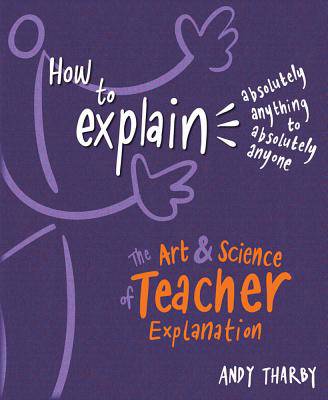
- Retrait gratuit dans votre magasin Club
- 7.000.000 titres dans notre catalogue
- Payer en toute sécurité
- Toujours un magasin près de chez vous
- Retrait gratuit dans votre magasin Club
- 7.000.0000 titres dans notre catalogue
- Payer en toute sécurité
- Toujours un magasin près de chez vous
How to Explain Absolutely Anything to Absolutely Anyone
The Art and Science of Teacher Explanation
Andy TharbyDescription
Explanation is an art form, albeit a slightly mysterious one. We know a great explanation when we see or hear one, yet nevertheless we struggle to pin down the intricacies of the craft
Just how exactly is it done?
In How to Explain Absolutely Anything to Absolutely Anyone, Andy Tharby eloquently explores the art and science of this undervalued skill and illustrates how improving the quality of explanation can improve the quality of learning. Delving into the wonder of metaphor, the brilliance of repetition and the timeless benefits of storytelling, Andy sets out an evidence-informed approach that will enable teachers to explain tricky concepts so well that their students will not only understand them perfectly, but remember them forever too.
By bringing together evidence and ideas from a wide range of sources including cognitive science, educational research and the study of linguistics the book examines how the most effective writers and speakers manage to transform even the most messy, complicated idea into a thing of wondrous, crystalline clarity. Then, by provoking greater thought and contemplation around language choices in the classroom, Andy spells out how the practical tools and techniques discussed can be put into practice.
Andy also puts the important role of learner autonomy in context, recognising that there is a time for teachers to talk and a time for pupils to lead their own learning and contends that, in most cases, teachers should first lay out the premise before opening the space for interrogation. Ultimately, How to Explain Absolutely Anything to Absolutely Anyone argues that good teaching is not about talking more or less, but about talking better.
Brimming with sensible advice applicable to a range of settings and subjects, this book is suitable for teachers and educators of learners aged 7 to 16.
Spécifications
Parties prenantes
- Auteur(s) :
- Editeur:
Contenu
- Nombre de pages :
- 184
- Langue:
- Anglais
Caractéristiques
- EAN:
- 9781785833670
- Date de parution :
- 13-02-19
- Format:
- Livre broché
- Format numérique:
- Trade paperback (VS)
- Dimensions :
- 183 mm x 221 mm
- Poids :
- 385 g

Les avis
Nous publions uniquement les avis qui respectent les conditions requises. Consultez nos conditions pour les avis.






